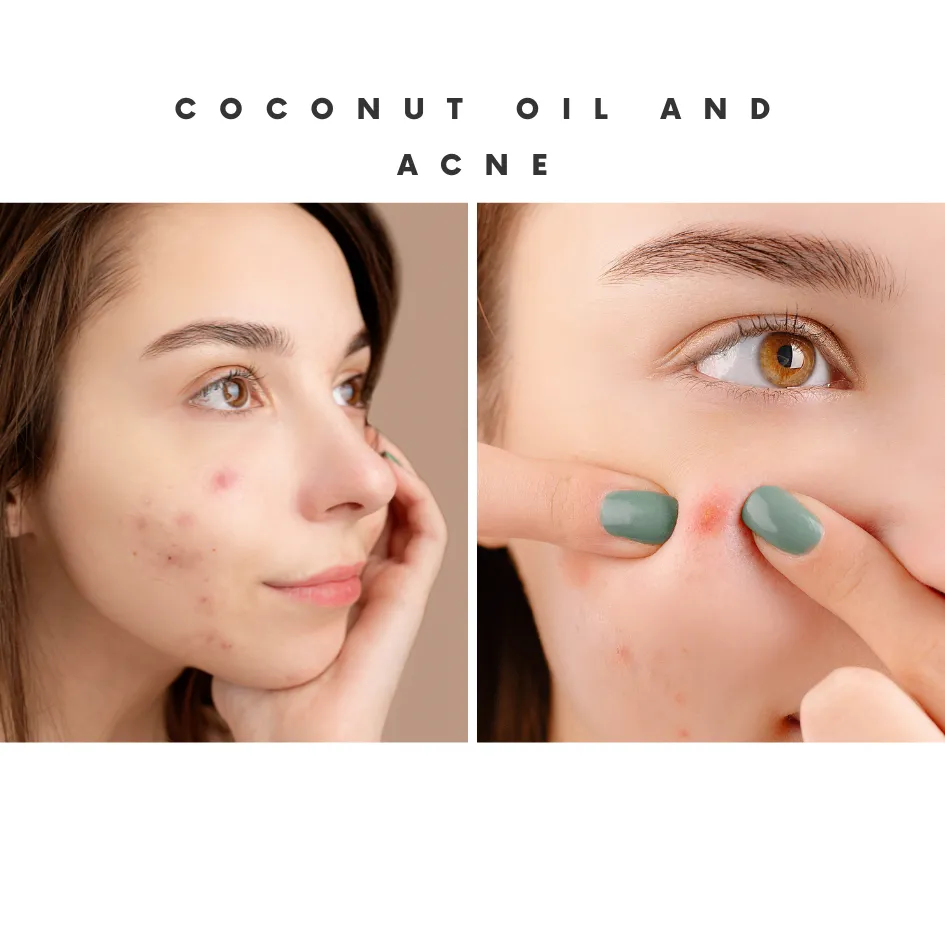Coconut Oil and Acne: A Balanced Examination
Coconut oil has gained significant attention in recent years for its diverse benefits, including skincare. However, opinions on its efficacy for acne-prone skin are mixed. Let’s delve into the science and personal experiences to determine the role of coconut oil in acne management.
Understanding Acne
Acne is a multifaceted skin condition with various types, each with its own characteristics and causes. Here’s a brief overview of some common types of acne:
- Whiteheads (Closed Comedones): Small, white bumps under the skin that form when a pore is clogged with oil and dead skin cells.
- Blackheads (Open Comedones): Similar to whiteheads, but the pore opening is enlarged, giving the bump a black appearance.
- Papules: Small, red bumps that form when the clogged pore becomes inflamed.
- Pustules: Pimple-like bumps that contain pus.
- Nodules: Large, painful bumps that develop deep under the skin.
- Cystic Acne: The most severe form of acne, characterized by large, inflamed cysts that can lead to scarring.
Properties of Coconut Oil
Coconut oil is a natural moisturizer and antibacterial agent. Its lauric acid content gives it anti-inflammatory and antimicrobial properties.
Potential Benefits for Acne-Prone Skin
- Moisturization: Coconut oil can help hydrate and soften the skin without clogging pores. This can be beneficial for people with acne-prone skin, as dryness can irritate the skin and trigger breakouts.
- Antibacterial Activity: Coconut oil’s lauric acid content may help reduce acne-causing bacteria.
- Anti-inflammatory Effects: Coconut oil’s anti-inflammatory properties may help reduce redness and inflammation associated with acne.
Potential Drawbacks for Acne-Prone Skin
- Comedogenicity: Coconut oil is comedogenic, meaning it can clog pores. This can be problematic for people with acne-prone skin, as clogged pores can lead to breakouts.
- Sensitivity: Some people may be sensitive to coconut oil, which can cause irritation or breakouts.
Safety Guidelines
- Patch Test: Before using coconut oil on your face, do a patch test on a small area of your skin to check for sensitivity.
- Use Unrefined Coconut Oil: Choose high-quality, unrefined coconut oil.
- Use Moderation: Apply a thin layer of coconut oil to your face and neck once or twice a day.
- Wash Your Face Thoroughly: Wash your face thoroughly after using coconut oil to remove any excess oil.
Personal Experiences
I have acne-prone skin and have used coconut oil in my skincare routine. Initially, I noticed that coconut oil helped hydrate and soften my skin. However, after a few weeks, I started to experience more breakouts. I realized that coconut oil was too comedogenic for my skin.
However, I still use coconut oil in my skincare routine, but in moderation. I mix it with other non-comedogenic oils, such as jojoba oil or rosehip oil. This helps me reap the benefits of coconut oil without the risk of breakouts.
Conclusion
Whether or not coconut oil is right for your acne-prone skin depends on your individual needs and response. If you decide to try coconut oil, be sure to use it in moderation and patch test it first.
If you are looking for other natural remedies for acne, here are a few suggestions:
- Tea tree oil: Tea tree oil has anti-inflammatory and antibacterial properties. It may help reduce acne breakouts and redness.
- Aloe vera: Aloe vera has anti-inflammatory and healing properties. It may help soothe and heal acne-prone skin.
- Oatmeal: Oatmeal has anti-inflammatory and exfoliating properties. It may help remove dead skin cells and reduce acne breakouts.
It is important to note that these are just suggestions and may not work for everyone. It is always best to consult with a dermatologist before trying any new skincare products or remedies.

